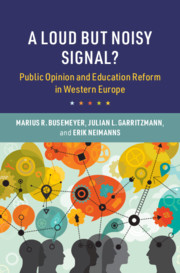Book contents
- A Loud but Noisy Signal?
- Cambridge Studies in the Comparative Politics of Education
- A Loud but Noisy Signal?
- Copyright page
- Contents
- Figures
- Tables
- Preface and Acknowledgments
- 1 Introduction
- 2 Theoretical Framework
- Part I Quantitative Evidence: Attitudes, Public Opinion, and Politics
- 3 Attitudes on Education Spending in Western Europe
- 4 Attitudes on Education Governance in Western Europe
- Part II Qualitative Evidence: The Role of Public Opinion in Education Reforms in Western Europe
- 9 Comparative Summary and Conclusions
- References
- Index
3 - Attitudes on Education Spending in Western Europe
from Part I - Quantitative Evidence: Attitudes, Public Opinion, and Politics
Published online by Cambridge University Press: 14 September 2020
- A Loud but Noisy Signal?
- Cambridge Studies in the Comparative Politics of Education
- A Loud but Noisy Signal?
- Copyright page
- Contents
- Figures
- Tables
- Preface and Acknowledgments
- 1 Introduction
- 2 Theoretical Framework
- Part I Quantitative Evidence: Attitudes, Public Opinion, and Politics
- 3 Attitudes on Education Spending in Western Europe
- 4 Attitudes on Education Governance in Western Europe
- Part II Qualitative Evidence: The Role of Public Opinion in Education Reforms in Western Europe
- 9 Comparative Summary and Conclusions
- References
- Index
Summary
This chapter analyzes attitudes and preferences toward education spending. Relying on representative survey data for eight European countries, it (1) studies what citizens want when it comes to education spending and (2) explores explanations for these preferences, i.e. the main latent political cleavages over education reform. The first part of the chapter sheds theoretical and empirical light on the question how salient is education expenditure compared to other (social) policy areas. Moreover, it explores how attitudes toward education spending relate to attitudes toward means to finance this spending (via taxation, debt, or retrenchment in other areas). The second part of the chapter studies preferences toward the distribution of spending on different sectors of the education system. The results show, among other things, that compared to other issues education is highly salient, particularly schools and vocational education and training. While public support drops considerably once increases in expenditure come at a price, there is an astonishingly high support for education-related taxes. The chapter reports evidence for several potential cleavages over education spending (e.g. along respondents’ income and educational backgrounds), the most consistent one being a partisan divide.
Keywords
- Type
- Chapter
- Information
- A Loud but Noisy Signal?Public Opinion and Education Reform in Western Europe, pp. 57 - 99Publisher: Cambridge University PressPrint publication year: 2020



